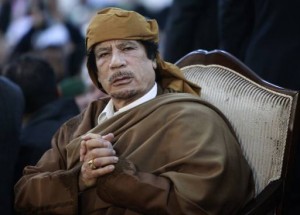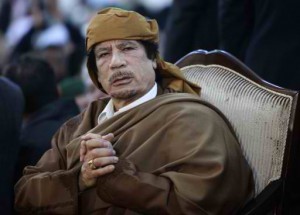By ROLAND G. SIMBULAN
 AS I write this, I reflect on an unforgettable country that I have traveled to in the mid-1980s—Libya —which is hogging the world headlines today. Libya is in the midst of a bloody civil war, or more accurately, at the center of a people’s uprising against its leader, Moamar Gadhafi, who has ruled Libya for almost 42 years.
AS I write this, I reflect on an unforgettable country that I have traveled to in the mid-1980s—Libya —which is hogging the world headlines today. Libya is in the midst of a bloody civil war, or more accurately, at the center of a people’s uprising against its leader, Moamar Gadhafi, who has ruled Libya for almost 42 years.
In 1987, I had the opportunity to travel to Libya whose official name under Gadhafi is the Socialist People’s Libyan Arab Jamahiriya. I was invited to speak at an international conference on imperialism, in the aftermath of the bombing of the Libyan capital of Tripoli by the United States then headed by President Ronald Reagan. In that bombing of Tripoli, Gadhafi’s residence had been destroyed, killing his infant daughter Hanna. At that time, Gadhafi was said to be fasting in a tent in the Sahara desert which occupies more than 80 percent of Libyan territory. Soon, he converted the devastated residence into a museum on anti-imperialism where visitors and tourists were led to see. The remains of US bombs that brought destruction and death to Tripoli were also displayed at the entrance of Gadhafi’s residential museum.
Our conference in Tripoli was attended by academics, NGO activists and even revolutionaries from all over the world. It was in that conference on anti-imperialism that I saw “The Leader” as he was referred to in Libya. Gadhafi, who was the host and keynote speaker in the conference, was more than three hours late. The conference could not start until he arrived, and when he did arrive, lo and behold!
Around him was a close-in security entourage of camouflage-uniformed women soldiers wearing red berets and armed with AK-47s. Gadhafi was wearing an Arab robe, reminding me of Jesus Christ, except that he was wearing a Muslim cap, similar to the ones worn by imams or Islamic religious leaders in the Philippines. Gadhafi spoke for two hours, and he disappointed me for not being the fiery speaker that I had imagined. He was soft-spoken as if in prayer. He spoke in Libyan but the English translation showed that he had, in fact, spoken very strong words: “Punish and kill all American imperialists and Zionists.”
Libya attracted world interest in 1969 when a young, idealistic army officer, Col. Moamar Gadhafi, led a successful coup against the monarch, King Idris. Idris collaborated with foreign interests in monopolizing the oil resources of his country. Gadhafi’s rise to power, then compared to Nasser of Egypt, was cheered by the Libyans for liberating them from monarchical oppression and breaking foreign monopoly over Libyan oil.
Gadhafi then expelled the British and US military bases and facilities, and nationalized all Libyan oil companies that represented unassailable foreign interests in north Africa.
Through his Green Book, Gadhafi introduced an Islamic version of socialism. He called it a direct democracy where a people’s congress met once a year and Libyans from all walks of life were invited to discuss and pass laws. Another indication of the unconventional governance existing in that country was when I saw sheep and other livestock being herded through counters of the Tripoli international airport and led to a plane.
Libyan Air, which flew us from Frankfurt in Germany to Tripoli in Libya, did not have a first class or an economy class. It had only one class for all passengers. You could seat yourself anywhere in the plane except probably the pilot’s cockpit. Their point was that there was no class stratification in their country.
I used to think that Filipinos were the only ones who are always late for appointments. This was until I came to Libya where everywhere we went, our hosts were always at least three hours late. When they did arrive, you had better be ready because they would leave you behind if you were not ready to go.
Unknown to many young Filipinos, Libya played an important role in recent Philippine history. The Tripoli Agreement between the Philippine government, represented by then First Lady Imelda Marcos who traveled to Tripoli, and the Moro National Liberation Front under Nur Misuari, was mediated by Gadhafi. That agreement is now recognized as Libya’s contribution to the Philippine peace effort.
Gadhafi was someone who had no problem with helping revolutionary movements even if Libya had diplomatic relations with their governments. He allowed the MNLF to establish a de facto embassy in Tripoli and gave military training to MNLF fighters. But Libya also donated for the Muslim mosque in Quiapo, the University of the Philippines’ Institute for Islamic Studies and several socio-economic projects for Muslim communities in Mindanao. Gadhafi’s heir-apparent, Saif al-Islam Gadhafi, who appeared recently on Libyan state television to denounce “trouble-makers,” has visited the Philippines many times for his foundation’s philanthropic activities.
That was because Libya saw itself as a center for anti-imperialist struggles. In solidarity with the Third World, it aided and trained military cadres of African liberation movements, including Nelson Mandela’s African National Congress and the Zimbabwe African National Union.
Our Libyan hosts gave us a farewell dinner under a huge tent in the Sahara desert where guests ate from a table that served marinated lamb and other delicacies, which we ate with our fingers. Belly dancers performed while the audience did the Arab war cry, a sound produced by the fast wiggling of the tongue.
While the event was going on, I decided to go to the toilet. There was none inside the tent so I went out to look for one. But outside there was only darkness and a mujahideen armed with a rifle. As if he knew what I was looking for, he pointed to the vast, empty desert. And there I was guided by the light from the stars and the moon shining over Gadhafi’s Libya.
